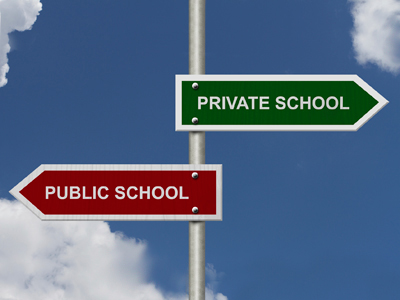What are Independent or Private Schools?
Independent (also called private or public) schools are schools which you have to pay for your child to attend. They may get a better education there but, wherever they go, a motivated, bright child will succeed – with your support.
If you'd like a PDF version of this page, simply click Independent or Private Schools PDF
 The school your child attends will significantly influence their future life, impacting friendships, qualifications, and career prospects. Making this crucial choice requires understanding different school types. This guide explores independent or private schools, outlining their definition, advantages, and factors to consider when selecting the right school for your child's needs.
The school your child attends will significantly influence their future life, impacting friendships, qualifications, and career prospects. Making this crucial choice requires understanding different school types. This guide explores independent or private schools, outlining their definition, advantages, and factors to consider when selecting the right school for your child's needs.
For information on other schools, check out our What are the Different Types of Schools? article.
LEARN ABOUT THE BENEFITS OF LEARNING THROUGH QUIZZES
How Many Children Attend Private or Independent Schools?
The Independent Schools Council reported that over 500,000 UK children attended independent or private schools in 2015, the highest number in forty years of recorded data.
Defining Independent or Private Schools
'Public,' 'private,' 'independent,' or 'fee-paying' schools all refer to similar institutions outside the state system. The term 'public school' usually denotes older, traditional boys' private boarding schools like Eton and Harrow, while other terms are interchangeable. Preparatory or 'Prep' schools cater to 8-13-year-olds, some with attached infants/nursery schools.
Public, private, independent, or fee-paying schools all refer to similar institutions outside the state system.
Reasons to Choose an Independent or Private School
Several reasons might lead you to choose an independent or private school for your child. Increased choice is a significant advantage, allowing you to select any private school, provided your child meets admission criteria and you can afford the fees. Additionally, you have the option to choose between boarding or day-pupil status.
Are Class Sizes Smaller in Independent or Private Schools?
Independent or private schools typically boast a favourable teacher:pupil ratio, with class sizes generally smaller than those in state schools. This ensures more personalised attention and assistance for each child, particularly valuable considering the increased competition for school places and larger class sizes in state primaries.
Does Independent or Private Education Offer a Better Experience?
While some state schools rival independent ones, 2016 research on academic added-value revealed that independent education generally outperforms in various aspects, including higher average scores in GCSE subjects.
FIND OUT WHY KIDS LOVE OUR WEBSITE
Building Connections in Independent or Private Schools
Connections play a role in choosing an independent school, with selective schools often attracting bright, motivated children focused on learning and achievement. Families may also choose schools based on tradition, but other factors should be considered.
Choosing the Best Independent School
After deciding on independent schooling, selecting the best school for your child becomes crucial. Consider factors such as ethos, curriculum, and the school's focus on academic achievement or other aspects. Ensure the school aligns with your child's needs and preferences.
Facilities in Independent or Private Schools
Private schools often occupy impressive buildings and, when adequately funded, maintain modern facilities. Visit potential schools to assess facilities and ensure they cater to your child's specific interests and talents.
Cost Considerations for Independent or Private Schools
Independent or private school costs should be carefully considered, with fees averaging over £15,500 per year. Account for additional expenses like uniform, travel, and extracurricular activities. Explore available bursaries or scholarships based on various criteria.
Children may get a better education in independent or private schools, but, wherever they go, a motivated, bright child will succeed – with your support.
Comparing Independent or Private Schools
Before choosing a school, compare options using resources like the Independent Schools Council. Consider registration dates, boarding options, and examine exam results, inspection reports, and school websites.

So, what are independent or private schools? They are schools that require payment for your child to attend.
Education Quality in Independent or Private Schools
While children may receive a superior education in independent or private schools, a motivated and bright child will succeed with your support, regardless of their educational path. If you have any questions about education, find answers in EQ's Knowledge Bank, a valuable resource for parents.



